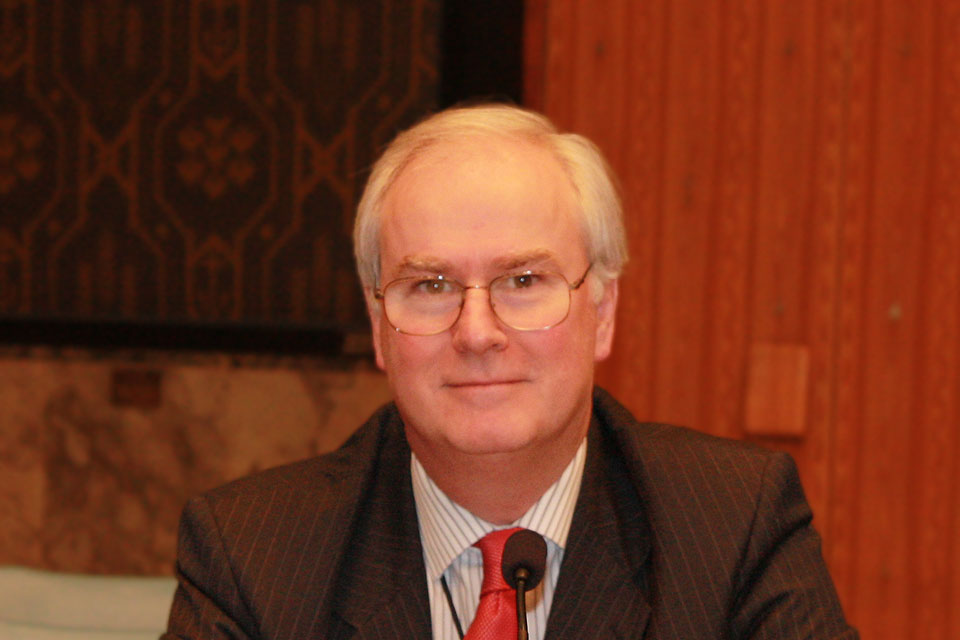"As we speak Russia is building up its forces on the Ukrainian border"
Intervention by Ambassador Lyall Grant of the UK Mission to the UN, to the Security Council Meeting on Ukraine

I would like to thank Mr Simonovic for his briefing and for his latest report on Ukraine.
I can understand why Ambassador Churkin does not want the Security Council to discuss this UN report. Because the report provides further damning evidence of the appalling abuses perpetrated against the civilian population by pro-Russian armed groups in eastern Ukraine.
It also acknowledges Ukraine’s legitimate right, and its sovereign duty, to restore law and order and to protect its citizens. We share the United Nations’ view that force must be used proportionately and in full compliance with domestic and international law. And we welcome Ukraine’s clear and unambiguous commitment to these important principles.
There is one overwhelming conclusion to be drawn from this report. That these armed groups cannot possibly claim to be acting in defence of the civilian population – the very same population against whom they are committing the most appalling human rights abuses. They are abducting women and children in order to extort money from their families. They are using civilians as forced labour and as human shields. They offer the local population the choice between fighting on the front lines, or facing detention, torture and mistreatment. They abduct people simply because they are HIV positive and tell them that they must, quote, “wash off the guilt with blood”.
All of these abuses – and many more – are detailed in the UN report. These are not the actions of those interested in protecting the civilian population. They are the actions of violent and abusive, armed thugs. As the UN report puts it, these groups exercise their power over the civilian population in “raw and brutal ways”, which are, and I quote, “putting the whole civilian population at risk”.
In addition to these human rights abuses, the report highlights that separatists have deliberately targeted critical public utilities including water, electricity and sewage. In so doing they are denying the people under their control access to basic services. We welcome the urgent action the Ukrainian Government is taking to restore these services in the liberated areas.
So if these armed groups are not defending the interests of the people they claim to represent, the question must be asked: whose interests are they defending? And we must also ask why the Russian Federation continues to support them? By supplying these groups with weaponry, training and personnel, Russia is fuelling the suffering of an innocent population – the same people whose welfare they claim to care so much about.
Throughout this crisis Russia has acted in violation of international law, in violation of human rights, and in violation of its own stated objectives. There have been many moments when Russia has had the opportunity to change course. When 100 countries rejected the illegal annexation of Crimea. When Ukraine elected a new President whose legitimacy could not be questioned. When 298 innocent lives were lost in the shooting down of MH17.
Yet despite these watershed events, Russia continues recklessly to fuel the conflict. As we speak Russia is building up its forces on the Ukrainian border. An additional 8000 troops have arrived since 11 July. Many more are stationed in the illegally-annexed region of Crimea.
And now we hear that Russia is ready to intervene on humanitarian grounds to alleviate the suffering that it has manufactured. This is completely unwarranted. Russia is the problem, not the solution. As we were briefed by OCHA earlier this week, the UN is already fully engaged. UN agencies, including UNHCR and UNICEF, are present on the ground and are working with the ICRC, International NGOs, civil society organisations and local communities to support the Ukrainian-led humanitarian response.
But rather than supporting this effort, Russia threatens unilateral action.
If Moscow wants to contribute, there are two things it can do immediately: First, it can help to fund these UN activities. Second, it can cease its support for illegal armed groups.
That is the only way the people of Eastern Ukraine will be able to return to their daily lives free from the fear of intimidation and violence that this report describes.
I thank you.